Key Takeaways
- Start with gentle walking immediately after surgery and gradually increase the intensity as your body heals.
- Regular exercise after bariatric surgery enhances weight loss results, improves overall health, and helps prevent weight regain.
- It’s important to work with your medical team to create a personalized exercise plan for safe and effective post-surgery fitness.
You might already be thinking about exercise after your bariatric procedure. While physical activity plays a key role in your recovery and long-term success, it’s important to know when to start and which exercises are safe to do. Whether you’re exploring life after bariatric surgery or setting new fitness goals, developing the right habits is essential.
This guide will walk you through everything you need to know about exercise after bariatric surgery.
Table of Contents
Establishing a Timeline for Resuming Physical Activity
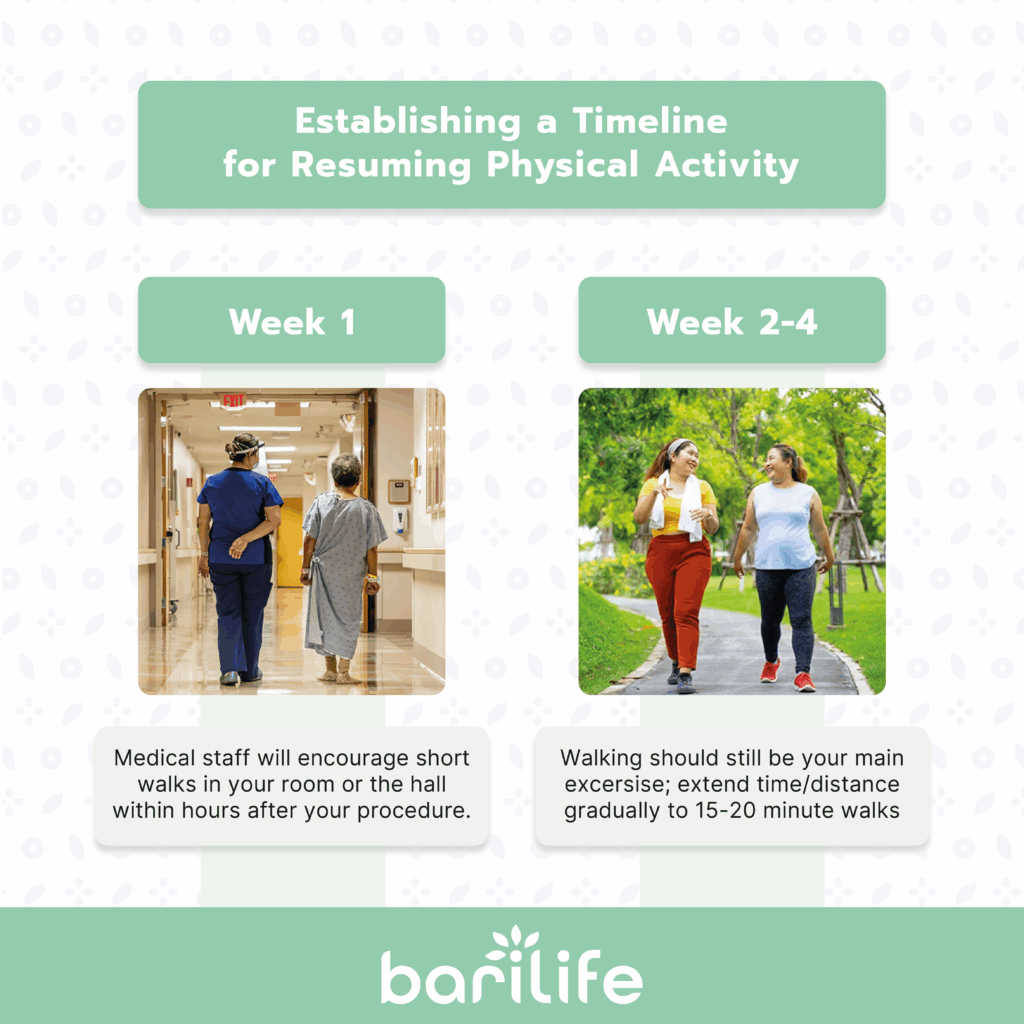
The journey back to physical activity after bariatric surgery happens in stages. Your body needs time to heal, and rushing into intense exercise too soon can cause complications. Here’s a general timeline to help you understand what to expect:
Immediately After Surgery (Week 1)
Believe it or not, movement begins almost immediately after bariatric surgery. Within hours of your procedure, medical staff will encourage you to get up and take short walks around your hospital room or in the hallway. This early movement is vital for preventing blood clots and promoting circulation.
Once you’re home, continue with light activities such as short walks around your house or neighborhood. Aim for 5-10 minutes of walking several times a day. These brief sessions will help your body recover while reducing the risk of complications.
During this phase, you can focus on:
- Walking at a comfortable pace
- Breathing deeply
- Moving gently around your home
- Avoiding sitting for extended periods
Early Recovery (Weeks 2-4)
As your body is healing, you can slowly increase your activity level. Walking should still be your primary exercise, but you can extend your time and distance. Start adding a minute or two each day, working toward 15-20 minute walks.
Gentle stretching exercises can also be introduced during this phase. Simple movements to improve flexibility will help prepare your body for more challenging activities later.
During weeks 2-4, avoid:
- Lifting anything heavier than 10 pounds
- Strenuous housework or yard work
- Abdominal exercises that might strain your surgical area
- High-impact activities
Building Phase (Weeks 4-6)
Around the one-month mark, and with your healthcare provider’s approval, you can begin incorporating more moderate activities into your routine. For most people, the 4-6 week period marks a significant turning point.
At this stage, you might begin:
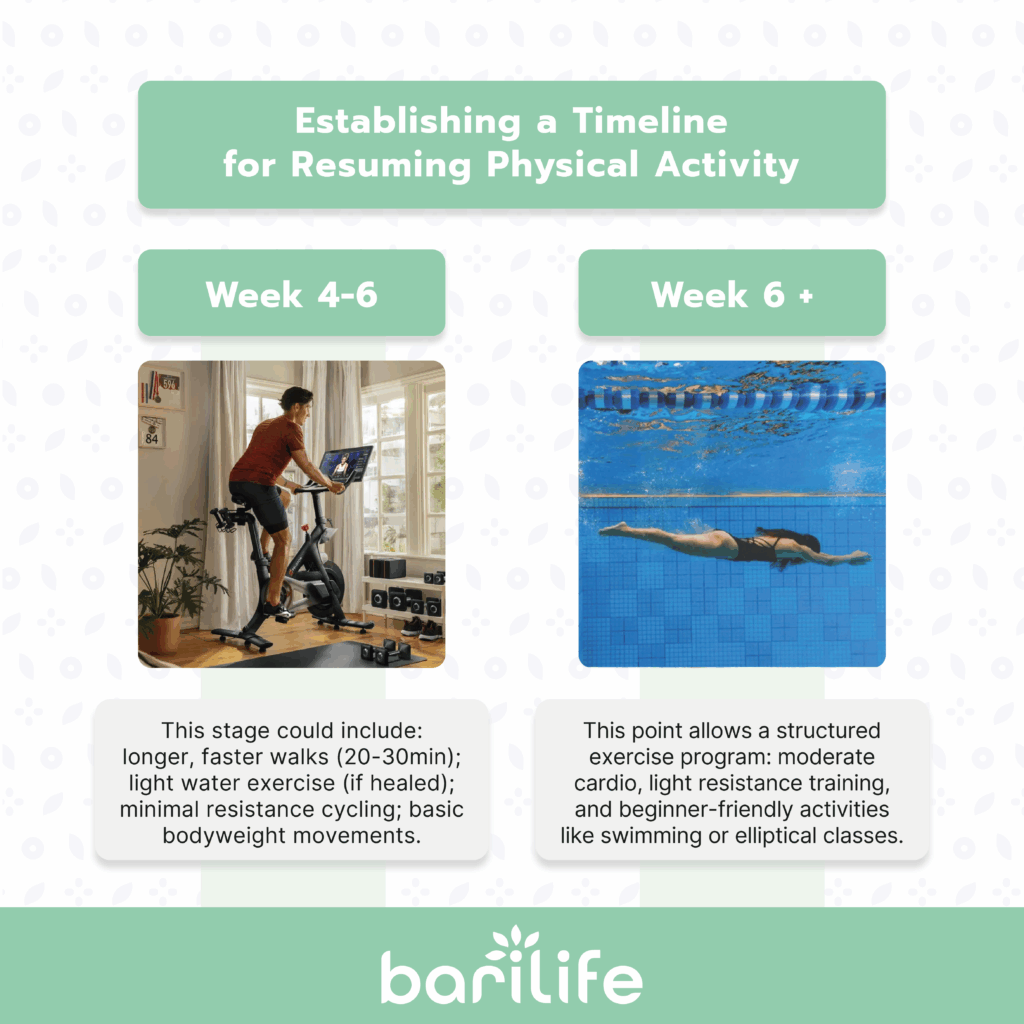
- Longer walks (20-30 minutes) at a brisker pace
- Light water exercises if your incisions are fully healed
- Stationary cycling with minimal resistance
- Basic strength movements using just your body weight
Your medical team will give you specific guidance about when you can exercise after bariatric surgery based on your individual recovery progress. Never advance to this stage without their explicit approval.
Advanced Recovery (6+ Weeks)
Six weeks post-surgery is typically when many bariatric surgery exercise guidelines allow for a more comprehensive fitness routine. At this point, most people can begin a more structured exercise program that includes:
- Moderate cardiovascular exercise
- Light resistance training
- More varied activities like swimming, elliptical training, or exercise classes designed for beginners
Usually, weight training after bariatric surgery can begin around this six-week mark, starting with very light weights and proper technique. Again, always get your healthcare provider’s approval before adding resistance training to your routine.
Benefits of Exercise After Bariatric Surgery
Incorporating regular physical activity into your post-surgery life offers several benefits that go far beyond just burning calories. Understanding these benefits can motivate you on days when exercising might feel challenging.
Enhanced Weight Loss
While bariatric surgery significantly restricts how much food you can eat, exercise after your procedure maximizes your weight loss results.For those considering how to build muscle after bariatric surgery, this stage is particularly critical. Regular physical activity:
- Boosts your metabolism, so your body can burn more calories throughout the day
- Preserves lean muscle mass during rapid weight loss
- Supports fat loss while maintaining vital muscle tissue
- Helps break through weight loss plateaus that commonly occur after surgery
Many people find that consistent exercise makes the difference between good and excellent weight loss outcomes.
Improved Physical Health
Bariatric surgery itself resolves many health conditions, but adding exercise amplifies these benefits. Regular activity improves:

- Cardiovascular health by strengthening your heart and enhancing circulation
- Lung capacity and oxygen efficiency
- Joint health and mobility
- Balance and coordination
- Blood sugar control
- Blood pressure levels
- Cholesterol profiles
Mental and Emotional Wellbeing
The psychological benefits of exercising after bariatric surgery shouldn’t be underestimated. Physical activity:
- Releases endorphins that enhance mood and decrease symptoms of depression and anxiety
- Builds confidence as you accomplish new fitness goals
- Provides structure and routine during a period of significant life changes
- Increases energy levels and reduces fatigue
- Improves sleep quality
Many people report that the mental health benefits of their bariatric exercise program become just as important as the physical ones.
Long-Term Weight Maintenance
Perhaps one of the most important benefits of consistent exercise is its role in preventing weight regain. Research consistently shows that people who maintain a regular exercise routine after bariatric surgery are much more likely to keep the weight off long-term. Physical activity becomes a crucial tool for maintaining your results for years to come.
Recommended Exercises After Bariatric Surgery
Knowing which exercises are both safe and effective after bariatric surgery helps you make the most of your workout time. Here’s a breakdown of recommended activities:
Walking
Walking remains the foundation of any post-bariatric surgery workout plan. It’s accessible, requires no special equipment, and can be easily modified to match your level of fitness. Here’s how to progress:
- Start with short, flat walks close to home
- Gradually increase your time by adding 5 minutes each week
- Once you can walk 30 minutes comfortably, begin increasing your pace
- Add inclines or hills as your fitness improves
- Consider using a fitness tracker so you can monitor your steps and progress
While your healthcare team will provide specific guidance, most success stories include working up to 30-60 minutes of walking daily.
Water-Based Exercises
Once your incisions have completely healed, water exercises offer excellent low-impact options for bariatric exercise:
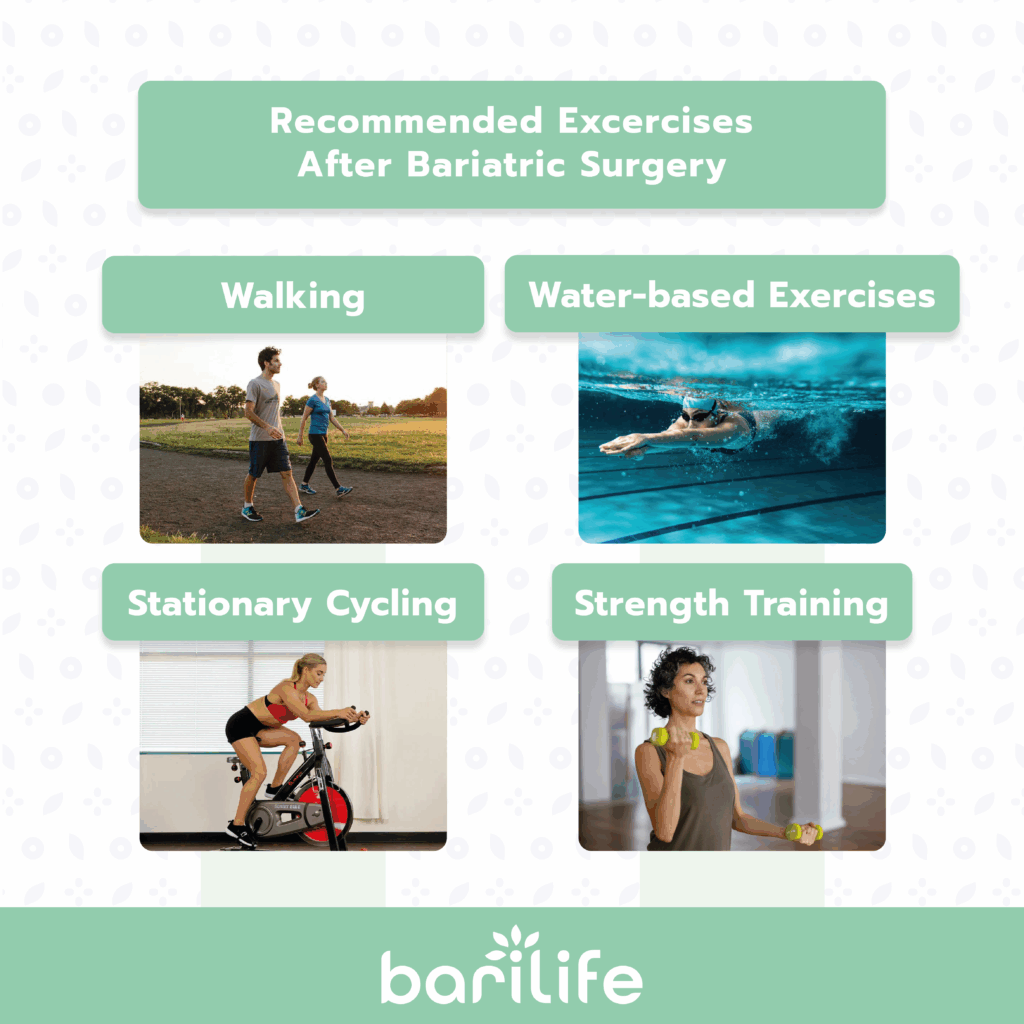
- Water walking in chest-deep water
- Swimming laps if you’re comfortable and skilled
- Water aerobics classes designed for beginners
- Aqua jogging with a flotation belt
The buoyancy of water reduces stress on the joints while giving natural resistance, so it’s ideal for those with mobility concerns or joint pain.
Stationary Cycling
A bariatric exercise bike provides an excellent, low-impact option for cardiovascular fitness. Recumbent bikes (the kind with a chair-like seat and backrest) are particularly good for beginners because they offer:
- Good back support
- Stability for those with balance concerns
- Adjustable resistance for progressive challenge
- A non-weight-bearing form of exercise
Start with 5-10 minutes at low resistance and gradually increase both time and intensity as your fitness improves.
Strength Training
Weight training after bariatric surgery is essential for maintaining muscle mass during rapid weight loss. Begin with:
- Body weight exercises like modified wall push-ups, chair squats, and supported lunges
- Resistance bands, which provide adjustable tension with minimal joint stress
- Very light dumbbells (1-3 pounds) for basic movements
- Machine exercises that control your range of motion
Focus on proper form rather than the amount of weight, and always include all major muscle groups for balanced development.
Flexibility Exercises
Gentle stretching and flexibility work should be part of your bariatric exercise program from early recovery onward: If you’re aiming for sculpted muscle tone without bulk, consider adding toning exercises after bariatric surgery like:
- Basic stretches for major muscle groups
- Gentle yoga designed for beginners
- Simple range-of-motion exercises
- Mobility work to maintain or improve joint function
Flexibility training helps prevent injury, reduces muscle soreness, and enhances your ability to do simple activities with ease.
Exercise Precautions & Safety Tips
Safety should always be your top priority when exercising after bariatric surgery. These guidelines will help you prevent complications and setbacks:
Listen to Your Healthcare Team
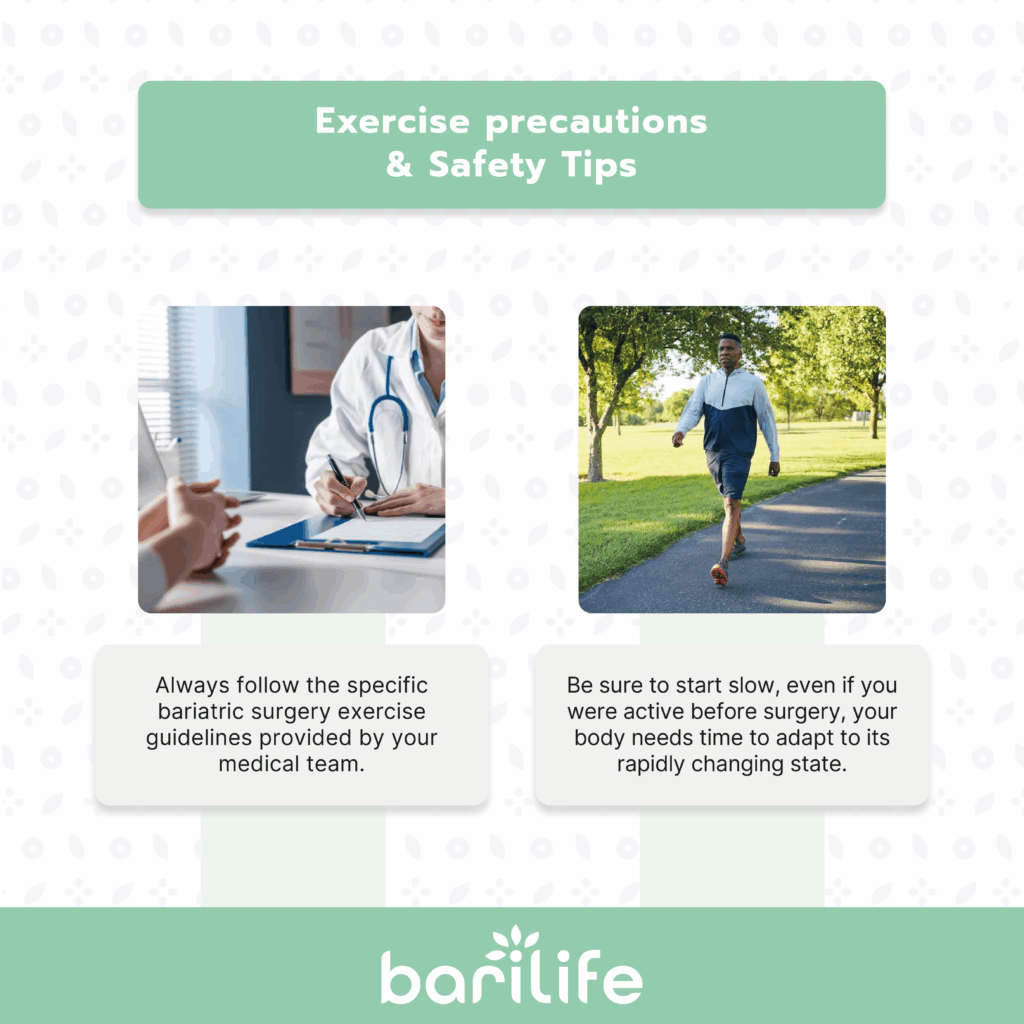
Always follow the specific bariatric surgery exercise guidelines provided by your medical team. Individual recovery can vary greatly, and what works for someone else might not be appropriate for you. If you’re unsure about when you can exercise after bariatric surgery, always default to your medical provider’s recommendations.
Start Slowly and Progress Gradually
One of the biggest mistakes people make is trying to do too much, too soon. Even if you were active before surgery, your body needs time to adapt to its rapidly changing state. When you increase duration, intensity, and frequency of exercise, make sure to do it in small increments to avoid injury and burnout.
Stay Hydrated (Carefully!)
Proper hydration is essential for exercise safety, but after bariatric surgery, you need to be strategic about drinking water:
- Sip water frequently throughout your exercise sessions
- Avoid drinking large amounts at once
- Stop drinking about 15 minutes before exercise and resume about 15 minutes after
- Follow your healthcare provider’s guidelines about fluid consumption
Dehydration can be dangerous, so learning to balance your fluid needs with your surgical restrictions is important.
Monitor Your Body’s Responses
Pay close attention to how your body responds to exercise. Stop immediately and contact your medical team if you experience any of these symptoms:
- Dizziness or lightheadedness
- Unusual pain or discomfort
- Nausea or vomiting
- Extreme fatigue
- Rapid heart rate that doesn’t slow down with rest
- Shortness of breath beyond normal exercise exertion
These symptoms could indicate complications that need medical attention.
Fuel Properly
Nutrition and exercise work hand in hand after bariatric surgery. Without adequate nutrition, your workouts will suffer and could potentially lead to complications. Work with your dietitian to ensure you’re getting enough protein to support muscle maintenance.
Make sure you time your meals appropriately around workouts and adjust your diet as your activity level increases. If needed, also take supplements to support your exercise recovery.
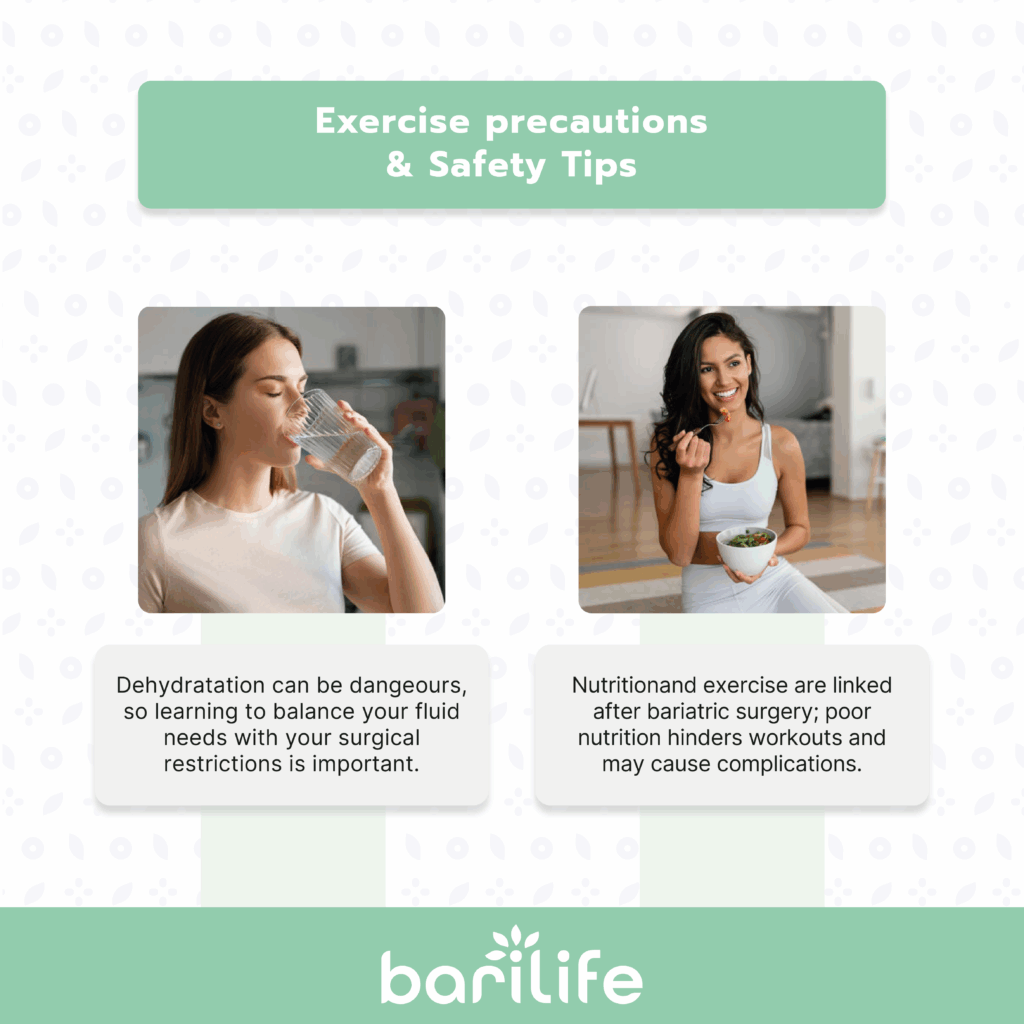
Common Challenges & How to Overcome Them
Even with the best intentions, you’ll likely face some obstacles in your exercise journey after bariatric surgery. Here are solutions to common challenges:
Physical Discomfort
It’s normal to have some discomfort when starting a new exercise routine, especially after surgery. To minimize any issues, make sure you’re wearing supportive footwear that is suitable for the activity you’re doing.
Additionally, you want to wear moisture-wicking and comfortable clothing that won’t rub against your incision sites. Always incorporate proper warm-up and cool-down periods into each workout.
If you’re dealing with specific pain points, consider working with a physical therapist. Finally, don’t hesitate to try different activities until you find ones that feel good for your body.
Fatigue and Low Energy
The combination of restricted food intake and recovery from surgery can leave you feeling fatigued. To combat this tiredness, try scheduling your workouts for times of the day when your energy levels are at their highest.
Breaking your exercise into shorter sessions spread throughout the day can also be beneficial. Make sure you’re getting adequate protein and adhering to your supplement regimen, as these nutrients are crucial for recovery.
Additionally, prioritize good sleep habits to help rejuvenate your body. Lastly, be patient; your energy levels will typically improve as your body adjusts to weight loss.
Motivation Challenges
Staying motivated for the long haul requires a solid strategy. Set realistic and measurable goals that extend beyond just weight loss, such as walking a certain distance or lifting a specific weight.
Tracking your progress can be helpful, so consider using an app, keeping a journal, or utilizing a fitness device to monitor your achievements. Finding an exercise buddy or joining a bariatric support group focused on fitness can also provide additional encouragement and accountability.

Remember to reward yourself for consistency, but opt for non-food rewards. Lastly, consider participating in group classes designed especially for those who underwent weight loss surgery, as they can give you support and motivation in your journey.
Plateaus
At some point, many people encounter an exercise plateau where progress seems to stall. To overcome this, consider changing your routine every 4 to 6 weeks to challenge your body in new ways.
Gradually increasing the intensity of your workouts instead of just extending their duration can also help push past the plateau. When appropriate for your fitness level, try incorporating interval training into your regimen to add intensity. Adding variety by exploring new activities can keep your workouts fresh and engaging.
Lastly, reassess your nutrition to ensure it’s supporting your increasing activity levels, as proper fuel is essential for continued progress.
Consulting with Healthcare Professionals
Working with experienced professionals makes all the difference in your post-surgery fitness journey. Here’s how to leverage their expertise:
Your Bariatric Surgeon and Medical Team
Your surgical team plays a crucial role in providing the foundation for your exercise guidance. They will give you specific timelines for when you can safely resume different activities based on your recovery.
Additionally, they can identify any individual restrictions that may be necessary based on your unique surgical experience. Your team will also monitor your progress and adjust their recommendations as needed to ensure that you are on the right track.
Furthermore, they can help you understand when unusual symptoms during exercise may warrant concern, making sure you stay safe as you embark on your fitness journey.
Physical Therapists
Many bariatric programs incorporate physical therapy as a key component of comprehensive care. Physical therapists can design personalized exercise regimens according to your unique needs, making sure that you are working out in a way that benefits your body. They focus on the importance of proper form to prevent injury during your workouts.

If you experience joint issues or limited mobility, they can provide modifications to exercises so that you can participate safely. Additionally, physical therapists help address any muscular imbalances that may have developed prior to your surgery.
Exercise Physiologists or Certified Trainers
Once you get medical clearance, you can work with fitness professionals who can significantly enhance your exercise program. It’s important to seek out trainers who have specific experience working with bariatric clients, as they will understand your unique needs and limitations.
Consider beginning with a few one-on-one sessions to learn proper form and create a strong foundation for your workouts. Consider also inquiring about small group training sessions designed specifically for individuals who have undergone weight loss surgery, as these can provide motivation and camaraderie.
Lastly, make sure that any trainer you work with maintains communication with your medical team as needed to support your health and safety throughout your fitness journey.
Conclusion
Exercise after bariatric surgery isn’t just beneficial—it’s essential for maximizing your results and maintaining them long-term. By following a progressive approach that respects your body’s healing process, you can safely build a routine that supports your weight loss objectives and improves your overall health.
Remember that consistency matters more than intensity, especially in the beginning. Start with the basics, follow your healthcare team’s guidance, and gradually challenge yourself as your fitness improves. Monitor your progress, celebrate your wins, and be patient with yourself during difficult days.
How Bari Life Can Help
For exercise to be effective, you need proper nutrition. Bari Life‘s specialized supplements are designed specifically to support your unique needs during this important journey. That includes a full range of bariatric vitamins, which are essential for long-term health and wellness after surgery.
Sufficient protein intake is vital for preserving muscle mass during rapid weight loss and supporting recovery after your workouts. With Bari Life bariatric protein shakes and bariatric protein bars, you can meet your daily protein goals even with your reduced capacity for food.
Bari Life also offers bariatric multivitamins in several convenient formats, including bariatric vitamins chewable, liquid bariatric vitamin, and bariatric multivitamin with iron, making it easy to stay consistent with your supplement routine.
In addition to core vitamins, Bari Life provides bariatric calcium chews and a specialized bariatric probiotic to help support bone health and digestion—two common concerns after bariatric surgery.
For those struggling with thinning hair post-surgery, Bari Life includes targeted bariatric vitamins for hair loss to help you feel confident inside and out.
And when you’re looking for something quick, tasty, and compliant with your nutritional plan, Bari Life offers a variety of satisfying bariatric snacks that support your goals without compromise.

Visit Bari Life today to discover how our science-backed supplements can help you build a healthier, more active life after bariatric surgery.
If you want to learn more, why not check out these articles below:
- Transfer Addiction After Bariatric Surgery
- Smoking After Bariatric Surgery
- Sex After Bariatric Surgery
- How To Sleep After Bariatric Surgery?
- PowerLifting After Bariatric Surgery
Resources
Life After Bariatric Surgery. (N.D.) ASMBS.
Cava, E., et al. (2017). Preserving Healthy Muscle during Weight Loss. Advances in Nutrition.
Sarwan, G., et al. (2024). Management of Weight Loss Plateau. Stat Pearls.



What are your tips and tricks to post-bariatric success?